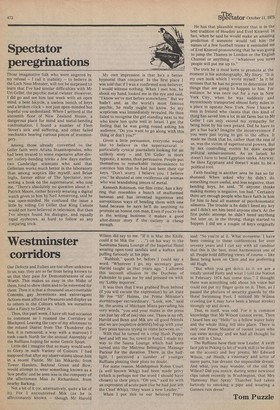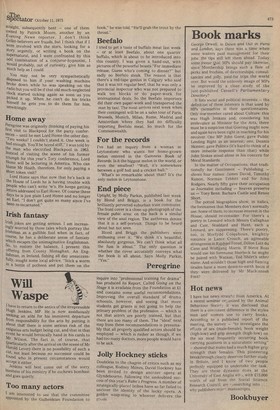Spectator peregrinations
Those imaginative folk who were angered by my refusal — I call it inability — to believe in the Loch Ness Monster, will not be surprised to learn that I've had similar difficulties with Mr Uri Geller, the psychic metal-twister. However, I did go and see him last week with an open mind, a bent bicycle, a useless bunch of keys and a broken clock — not just open-minded but hopeful you understand. When I arrived at the sixteenth floor of New Zealand House, a dangerous place for mind and metal-bending confrontation, I found a number of Fleet Street's sick and suffering, and other failed mechanics bearing curious pieces of ironmongery.
Among those already converted to the Geller faith were Ariana Stassinopoulos, who had been treated to some expensive after-dinner cutlery-bending tricks a few days earlier, two Cambridge scientists who said that Gellerism works much better in the laboratory than among sceptics like myself, and Brian Inglis, former editor of The Spectator, now writing a book on the supernatural, who told me, "There's absolutely no question about it." Patrick Moore, rather bravely wearing a digital watch given to him by Neil Armstrong, said he
was open-minded. He confused the issue a little by telling Uri Geller that King Canute would not have believed in television. But then I've always found his dialogue, and equally rapid eyebrows, as hard to follow as any conjuring trick. My own impression is that he's a better hypnotist than conjuror. In the first place I was told that if I was a confirmed non-believer, I would witness nothing. When I met him, he shook my hand, looked me in the eye and said, "I know we've met before somewhere." But we hadn't and, as the world's most famous psychic, he really ought to know. So my scepticism was immediately revealed. He then failed to recognise the girl standing next to me who knew him quite well in Israel. I got the feeling that he was going round asking his audience, "Do you want to go along with this thing or don't you?"
Given a little persuasion, everyone would like to believe in the supernatural — particularly cynical journalists looking for an unlikely story — and Uri Geller is more hypnotic, it seems, than persuasive. People put themselves to remarkable inconvenience to convince him that he had just bent their car keys. "Don't worry. I believe you. I believe you," he shouted at one vociferous old woman who was brandishing pieces of metal.
Kenneth Robinson, our film critic, has a key ring that resembles a bunch of malformed bananas and has invented ingenious and surreptitious ways of bending them with one hand because he says he'll do anything to promote an honest con-man. Even if you're riot in the writing business it makes a good after-dinner story if the cutlery is cheap enough. He has that plausible manner that is in the best tradition of Houdini and Evel Knievel. In fact, when he said he would make an amazing prediction if someone would tell him the names of a few football teams it reminded me of Evel Knievel pronouncing that he was going to jump the Thames in London or the English Channel or anything — "whatever you news people will put me up to."
The trick he is most keen to promote at the moment is his autobiography, My Story: "It is my own book which. I wrote myself." ln it he stresses that he has no power to determine the things that are going to happen to him. For instance, he was once out for a run in New York City, when he was suddenly and mysteriously transported almost forty miles to a place in upstate New York. Now I know a man in Ireland who claims that this kind of thing has saved him a lot in air fares but to Mr Geller I can only extend my sympathy for being hoist by his own petard. Did he have to get a bus back? Imagine the inconvenience if you were just trying to get to the office. It made me think that he, rather than the rest of us, was the victim of supernatural powers. But by not controlling events he does escape political embarrassment. As an Israeli he doesn't have to bend Egyptian tanks. Anyway, he likes Egyptians and doesn't want to be a political tool.
Faith-healing is another area he has so far shunned. When asked why he didn't do something more useful, and less negative, than bending keys, he said, "If anyone thinks making money is negative, too bad." Certainly there are enough people who have faith in him for him to heal all manner of psychosomatic ailments. The trouble is he didn't bend my key and I didn't see him bend anyone else's. At the first public attempt he didn't bend anything but later on, in the throng, things started to happen. I did see a couple of keys originally
straight, subsequently bent — one of them owned b Patrick Moore, another by an yEvening News reporter. I don't think Geller-believers are frauds, but I think that if I were involved with the stars, looking for a story urgently, or writing a book on the supernatural, and I were confronted by this odd combination of a conjuror-hypnotist, I would probably, out of curiosity, give him as much help as I could. You may not be very sympathetically disposed to him if your washing machine broke down while he was speaking on the radio but you will be if that old much-neglected Clock started ticking again as soon as you Picked it up. When he can't do his tricks himself he gets you to do them for him, unwittingly.
Home away
Peregrine was originally thinking of paying his first visit to Blackpool for the party confer ences — until he met Lord Home the other day. Two weeks? I couldn't stand it. One week is bad enough. You'll be bored stiff," I was told by the man who electrified Blackpool in 1963. Instead of visiting the scene of his former triumph for this year's Tory conference, Lord Home will be lecturing in America. Who can blame Mr Heath, therefore, for only paying a short token visit? Lord Home says that now that he's back in the House of Lords he is having trouble with People who can't write 'w's. He keeps getting letters addressed to Earl Howe. Of course these days he is just plain Lord Home and no longer an Earl. "I don't get quite so many since I've been re-incarnated."
Irish fantasy
Irish jokes are getting serious. I am increasingly worried by those tales which portray the Irishman as a gullible fool when in fact, of course, he has a deliberate sense of fantasy Which escapes the unimaginative Englishman. So, to restore the balance, I present this offering from County Monaghan. An Englishman, in Ireland, fishing all day unsuccessfully, sought some local advice. "Stick a worm in a bottle of potheen and put them on the hook," he was told. "He'll grab the trout by the throat."
Beefalo
I tried to get a taste of buffalo meat last week — or at least Beefalo, about one quarter buffalo, which is about to be introduced into this country. I was given a hand-out, with pictures of the powerful beasts "For immediate release, Guess who's coming to dinner?" but sadly no Beefalo steak. The reason is that there's a red-tape genius in Calgary who said that it was not regular beef, that he was only a provincial inspector who was not prepared to walk ten blocks or do paper-work for international deals, So the Beefalo importers did their own paper-work and transported the man by taxi. The meat arrives next week when their contingent will be on a sales tour of Paris, Brussels, Munich, Milan, Rome, Madrid and Amsterdam where they had no difficulty importing Beefalo meat. So much for the Commonwealth.
For the records
I've had an inquiry from a woman in Leytonstone who wants her home-grown melon entered in the Guinness Book of Records. Is it the biggest melon in the world, or even the smallest? "Well, it's somewhere between a golf ball and a cricket ball."
What's so remarkable about that? It's the only melon in Leytonstone.
End piece
Uptight, by Molly Parkin, published last week by Blond and Briggs, is a book for the brilliantly perverted suburban train commuter. The front cover is a close-up photograph of the female pubic area: on the back is a similar view of the anal region. The authoress denies that it is a self-portrait. Things to be heard. about but not seen. Blond and Briggs the publishers were enthusing over it: "We think it's beautiful, absolutely gorgeous. We can't think what all the fuss is about." The only question is whether the cover accurately conveys what the book is all about. Says Molly Parkin, "Yes."
Peregrine



































 Previous page
Previous page